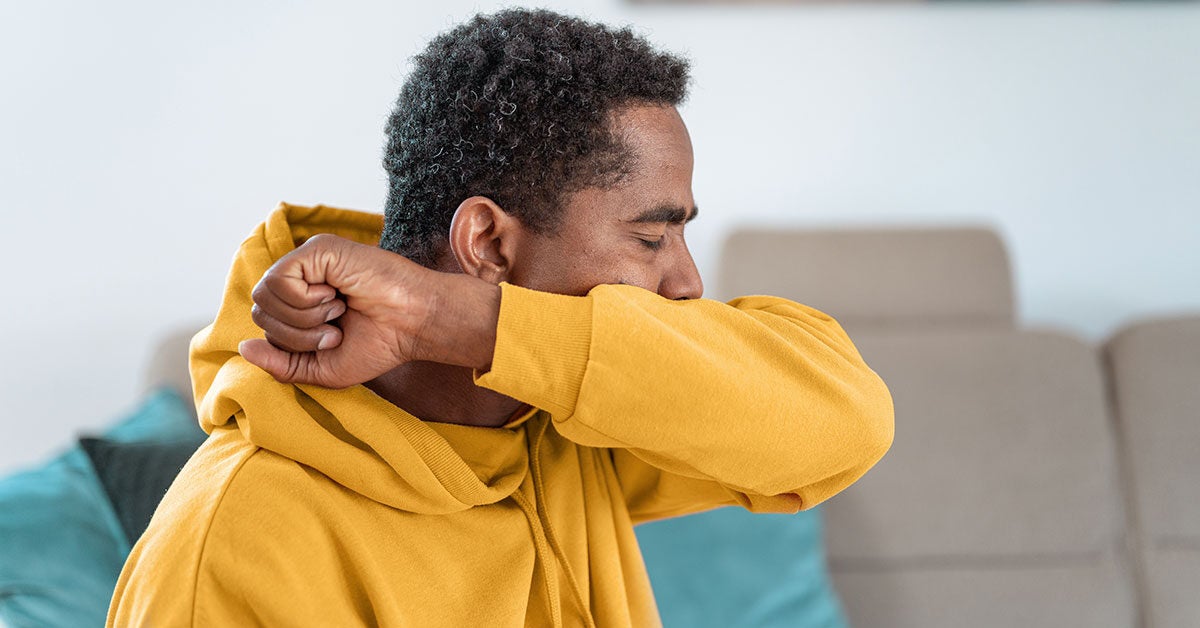COVID Cough vs. Normal Cough: How to Tell the Difference - Healthline

A cough is one of the hallmark symptoms of COVID-19. But a cough is also a typical symptom of many other conditions, including the flu, the common cold, or seasonal allergies.
If you're coughing, you may wonder how — or if — you can tell whether it's due to COVID-19 or a different condition. This article will look at some ways you may be able to tell the difference.
Researchers in 2021 tried to study the sounds a person makes to determine if they can detect COVID-19 via cough.
They have been able to tell the difference between a person who coughs to, say, clear their throat versus someone who coughs because they have an illness. But there isn't a way to definitively diagnose COVID-19 by cough sound detection, according to a 2022 study.
About two-thirds of coughs related to COVID-19 are dry coughs that don't produce mucus, according to the same 2022 study. This means that most coughs are going to be dry and hacking. With dry cough, it's often hard to stop coughing once you start.
Still, you may sometimes cough up mucus when you have COVID-19.
These characteristics differ from a "normal" cough, where your body is trying to get rid of some kind of irritant. Such coughs are usually self-limiting and won't continue throughout the day.
It's difficult to tell by listening to your cough whether you have COVID-19 or something else. But COVID-19 is often accompanied by other hallmark symptoms.
The following chart breaks down some common symptoms of conditions that may cause you to cough. This chart may help you if you are trying to determine whether your cough is due to COVID-19.
The most definitive way you'll be able to tell is through testing. You can use tests that determine whether you have COVID-19, the flu, or both — and yes, you can get both COVID-19 and the flu at the same time.
While no specific tests exist for the common cold, they can sometimes help you rule out other conditions. If a healthcare professional rules out COVID-19 and flu, a cold could be a likely cause of your cough. Colds also tend not to last as long as the flu or COVID-19.
If you have a cough related to COVID-19, you may experience chest discomfort and interrupted sleep — a concern when you're trying to rest and recover.
Some methods you can use to specifically address your cough include:
- Drink plenty of fluids throughout the day. This helps to keep your throat moist and reduces irritation.
- Use a cool mist humidifier if the air in your home is very dry. You could also take a hot shower with the door closed to generate plenty of steam.
- Consume cold or hot foods, like popsicles, warm tea, broth, or ice chips. These can all soothe irritated throats and reduce coughing.
- Consider over-the-counter (OTC) cough drops or cough-reducing lollipops.
- Consume a teaspoon of honey. (Infants younger than 1 year old should not consume honey for safety reasons.)
Using cough medication can be controversial if you have a wet cough that brings up mucus. If you suppress your cough, you may not get all the mucus up. Instead, you may wish to take a cough expectorant, which helps you cough the mucus up.
If you have a dry cough, which is typical with COVID-19, taking cough suppressants can help.
The following are some frequently asked questions about COVID-19 and coughing.
How long does COVID cough last?
An estimated 2.5% of people reported a cough that lasted 11.2 months after hospitalization for COVID-19. While most people's coughs don't last quite this long, an estimated 19% of people experience a cough after they've gotten over most of the symptoms of COVID-19.
Coughing is a reflex that helps clear the airways of mucus, dust, and other irritants. A cough can also be a symptom of irritated airways. Even after recovering from COVID-19, your airways could take a little longer to heal.
Does COVID cough get worse at night?
Coughs tend to get worse at night for a few reasons.
If you have a runny nose, lying flat can worsen postnasal drip. This means the mucus runs down the back of your throat, irritating it and causing you to cough.
You may also notice your dry cough is worse at night because you're usually indoors, where the air tends to be drier and more irritating to your airways. Using a cool mist humidifier may help reduce this occurrence. (But be sure to keep the humidifier clean and dry when not in use).
Is coughing up mucus typical in people with COVID-19?
An estimated 67% of people with COVID-19 experience a dry cough, according to 2021 research. A dry cough doesn't bring up mucus. The other 33% report coughing up mucus or phlegm.
Can COVID-19 cause you to cough up blood?
Coughing up blood (hemoptysis) is a very rare symptom of COVID-19. About 1% to 5% of people with COVID-19 experience this symptom. It's most common if your infection leads to pneumonia or if you have a pulmonary embolism at the same time, per
Hemoptysis can be a medical emergency. If you cough up more than a teaspoon of blood, consider connecting with a healthcare professional as soon as possible.
A COVID-19 cough is usually a dry cough. Other symptoms, such as fever and fatigue, tend to accompany it. Treating the cough with OTC methods can help you rest more easily as you recover.
Some signs may suggest that your COVID-19 cough could be serious. If you're coughing up blood or if your cough makes you feel very short of breath, seem immediate medical attention.

Comments
Post a Comment